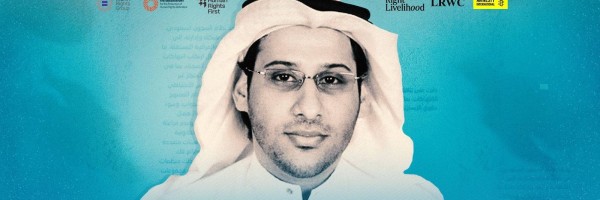Saudi Arabia’s Crown Prince Mohammed bin Salman has said on several occasions recently that he wants to return the country to “moderation”, or “moderate Islam”, and that he wants to fight “extremism”. His promises and visions in connection with these claims bear no relation to what is happening on the ground, since even as he spoke a harsh campaign of arbitrary arrests was going on. The authorities tried to brand the detainees “extremists”, hoping this would convince ordinary people, and those with little idea of what was going on, but in actual fact many of those arrested are leading reformers, prominent figures in human rights, and advocates of… moderation.
The Saudi authorities have come under criticism from the UN’s Working Group on Arbitrary Detention, its Special Rapporteur on Freedom of Opinion and Expression and its Special Rapporteur on the situation of Human Rights Defenders, among other rapporteurs and groups attached to the Office of the United Nations High Commissioner for Human Rights (OHCHR), for their mass arrests of human rights defenders, activists and others, to which the Saudi authorities’ response has been evasive and at odds with the treaties and agreements they have signed. And yet they still persist in keeping human rights activists and other prisoners of conscience locked up; they persist in putting them on trial at the same rate as before, and with the same or even greater legal flaws and abuse of process. And they persist in throwing still more human rights workers and reformers into jail, thus making all too clear the contradiction between what they claim and say and undertake, and what they actually do.
As the Crown Prince delivered his promises, members of the Saudi Civil and Political Rights Association (ACPRA) were languishing – and continue to languish – in jail, between them serving sentences totalling 199 years in prison terms and travel bans combined.
The last two ACPRA members were swept up in the latest wave of arrests: Abdulaziz al-Shubaily was arrested in order to serve an eight-year jail sentence, to be followed by an eight-year ban on travelling and writing, and Issa al-Hamid was arrested while out shopping with one of his young children. The circumstances of Hamid’s arrest certainly give no hint of any interest in reform or in allowing reformers to operate or live in dignity. Shubaily and Hamid are human rights activists and defenders of rights and liberties, advocates of compromise and tolerance. Among their colleagues still in prison are former judge Suleiman al-Rashoudi, now in his eighties, the celebrated activist Fawzan al-Harbi, Dr Abdulkareem al-Khodr, Dr Mohammed bin Fahad al-Qahtani, and the brothers Dr Abdullah and Dr Abdulrahman al-Hamid.
Several other human rights activists are still in prison, having been arrested and sentenced because they stood up for human rights and called for an end to government abuses.
They include Fadhel al-Manasif, in detention since 2011 and sentenced to 15 years in jail, a ban on travelling for a further 15 years and a fine of SR100,000 ($26,500), and Waleed Abu al-Khair, held since 2014 and sentenced to 15 years in jail, a 15-year travel ban and a fine of SR200,000 ($53,000).
Rights activist Essa al-Nukheifi was arrested last December; a session of his trial was held on October 30, 2017, and the court set November 19, 2017 for another hearing of his case. January 9, 2017 saw the arrest of rights activist Essam Koshak; the final session of his trial took place on October 30, 2017, and November 28, 2017 was set as the date for the verdict to be handed down.
Also still in jail are several prisoners of conscience arrested by the authorities for their peacefully held opinions, such as the writer and journalist Alaa Brinji, who has consistently called for reform and for women to be allowed to drive and is currently serving a seven-year jail sentence; the Palestinian poet Ashraf Fayadh, who was arrested for publishing poems; Raif Badawi, arrested for articles published on a website that he managed on behalf of persons close to the government; writer and journalist Nadhir al-Majid; broadcaster Wajdi Ghazzawi; and many others.
What makes it clear that the authorities are carrying on in the same way as before, and at an even higher tempo, is that in this latest wave of repression and arrests – which has rounded up prominent reformers like Dr Salman al-Awdah, well known for his moderate views and an open supporter of human rights values; the writer Abdullah al-Malki, also a leading reformer; economist Essam al-Zamil; the cancer-stricken reformer Mustafa al-Hassan; Sharia scholar Hassan Farhan al-Malki, who is noted for his anti-extremist views and opposition to violence – the authorities raided these men’s homes and arrested them roughly and rudely, without regard to their human rights and causing distress to the victims’ families and children in the process.
When the Saudi authorities resolved to lift their ban on women driving, following pressure at home and abroad – having for years forbidden it and imprisoned female activists who disobeyed, as well as confiscating their vehicles – they took great pains to make it known to all that there was no social opposition to women driving and no religious prohibition, as the authorities had always claimed. It was made clear to everyone that the religious hierarchy consented, and that the move was massively welcomed by different segments of society, thus showing how dishonest the authorities have been all along in hiding behind social attitudes as an excuse for their repression and denial of people’s basic rights. ALQST has had confirmation from a number of sources on the ground that State Security contacted all female activists to warn them against expressing their views on the lifting of the driving ban, and forbidding them to comment in any way. It was meanwhile suggested to several women close to the government, such as senior officials’ wives, that they, rather than the activists, should speak out to praise and thank the king and government, so that it would not be seen as a victory for the activists’ struggle. So there was repression and a muzzling of free speech even in the matter of granting a right.
One of the most significant things the Saudi Crown Prince said in his call for moderation was that he would destroy anyone standing in his way, clearly signalling a crackdown on all who object to his policies – policies, let it be remembered, that may lead the country into the unknown, be it his war on Yemen, or straining relations with other states, or his putting the country’s economy in jeopardy. It is a message, however, that many ordinary people and those who don’t know much about the country might take to be a threat against radicalism and extremism.
ALQST maintains that radicalism and extremism are a product of the Saudi authorities’ behaviour and approach. The authorities ban all forms of expression of opinion, and exercise total control over the public space. They hold responsibility for education, the media and religious sermons, and above all for muzzling people and preventing them from expressing themselves by peaceful means. They declare human rights unlawful in Islam, and create enmity between different communities and between different sects within the same community; they make a principle of not accepting others, declaring them infidels and keeping them at bay. This has always been the case, from the initial founding of the Saudi state, when they killed people who disagreed with them, to their recent promises of change to make them look good while they jail everyone who takes a different view.
But “moderation”, or a return to “moderate Islam”, requires genuine tolerance, not extremism and the destruction of opponents; it calls for the acceptance of alternative opinions and a willingness to hear them, to allow the free expression of opinions, and to promote the values and culture of human rights, so as to produce for us a society where differences lead to debates, not to extreme options like prisons and repression, or violence and wars.
ALQST maintains that the first step to reform is not to issue promises that are not kept, nor to pledge to destroy opponents, nor further repression and attempts to mislead public opinion, but to immediately and unconditionally release all prisoners of conscience; stop putting people on trial and punishing them for their peacefully held civic views; ensure a fair and independent judicial system; and end violations of human rights and curbs on freedom of speech and expression, so that Saudi society can genuinely move toward reform, moderation and coexistence, and enjoy the rights to which all are entitled.


